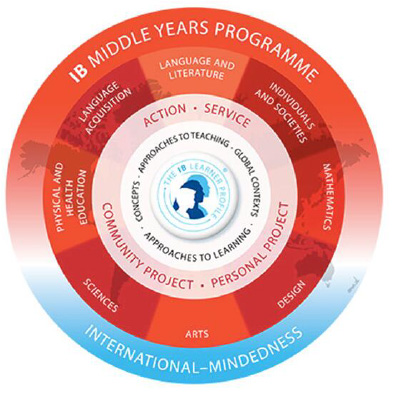
The IB program was founded in 1968 in Geneva for students who are educated in different countries. With every country having a different type of curriculum, it can be difficult for college admission offices to make sense of a student's transcript when high school graduation day arrives.
The IB program created a standardized curriculum that participating schools worldwide would use for the last two years of high school. It is required that an examination student must pass at the end of their senior year in order to receive an IB diploma.
Diploma Program (DP): set for high school students aged 16 to 19
Middle Years Program (MYP): set for middle school students aged 11 to 16
Primary Years Program (PYP): set for primary students aged 3 to 12
1)Holistic learning emphasizes links between disciplines, providing a global view of situations and issues.
2)The intercultural awareness is concerned with developing students’ attitudes, knowledge and skills as they learn about their own and others’ social and national cultures.
3)Communication is essential to learning, as it supports inquiry and understanding, The MYP stresses language acquisition for it not only allows students to explore multiple forms of expression, but also helps maintain culture diversities, personal development and improve multicultural awareness. Two languages are required to learn during the middle school year.
An IB education represents a balanced approach, offering students access to a broad range of content that spans academic subjects.
Conceptual learning focuses on powerful organizing ideas that have relevance within and across subject groups. Concepts reach beyond national and cultural boundaries. They help to integrate learning, add coherence to the curriculum, deepen disciplinary understanding, build the capacity to engage with complex ideas and allow transfer of learning to new contexts. PYP students encounter key and related concepts, and students in the MYP, IBCC and DP further develop these conceptual understandings.
IB curriculum frameworks value concurrency of learning. Students encounter many subjects simultaneously, approaching concepts from a variety of perspectives throughout their programmes of study; they learn to draw connections and pursue rich understandings about the interrelationship of knowledge and experience across many fields. Course aims and programme requirements offer authentic opportunities to learn about the world in ways that can reach beyond the scope of individual subjects through interdisciplinary learning.
An IB education represents a balanced approach, offering students access to a broad range of content that spans academic subjects.School provides at least 8 main disciplinary including Language and Literature, Language Acquisition, Math, Science, Individual and Society, Art, Design and Physical and Health Education. In addition, school also offers Economic, Psychology and personal project to better prepare students for Diploma Programme(G11-G12)
MYP Personal project is student-centred and age-appropriate, and it enable students to engage in practical explorations through a cycle of inquiry, action and reflection. MYP Personal Project helps students to develop the attributes of the IB learner profile; provides students with an essential opportunity to demonstrate ATL skills developed through the MYP; and fosters the development of independent, lifelong learner.
INQUIRERS Students develop their natural curiosity, acquiring the skills necessary to conduct inquiry and research, showing independence in learning as they enjoy learning. This love of learning will be sustained throughout their lives.
KNOWLEDGEABLE Students explore concepts, ideas and issues that have local and global significance, acquiring in-depth knowledge and developing understanding across a broad and balanced range of disciplines.
THINKERS Students exercise initiative to apply creative and critical thinking skills to recognize and solve complex problems, making reasoned ethical decisions.
COMMUNICATORS Students understand and express ideas and information confidently and creatively in more than one language and mode of communication. They work effectively and willingly in collaboration with others.
PRINCIPLED Students act with integrity and honesty, with a strong sense of fairness, justice and respect for the dignity of the individual, groups and communities, taking responsibility for their own actions and resulting consequences.
OPEN-MINDED Students understand and appreciate their own culture and personal history while being open to other perspectives, values and traditions as are willing to seek and evaluate other points of view; and ready to grow from the experience.
CARING Students show empathy, compassion and respect towards the needs and feelings of others with a personal commitment to service, acting to make a positive difference to the lives of others and to the environment.
RISK-TAKERS Students approach unfamiliar situations and uncertainty with courage and thought, having the independence of spirit to explore new roles, ideas and strategies, and are courageous and articulate in defending their beliefs.
BALANCED Students understand the importance of intellectual, physical and emotional balance to achieve personal well-being for themselves and others.
REFLECTIVE Students give thoughtful consideration to their learning and experience, assessing and understanding their strengths and limits to support learning and development.
